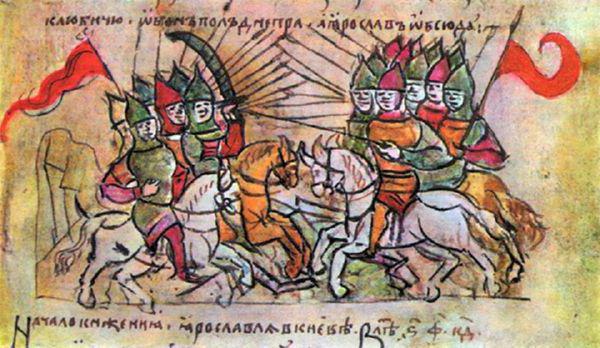The battle on the Alta River between the Russian princes, the sons of Yaroslav the Wise, and the Polovtsian army took place in 1068. There is not much news about this battle in the annals, but meanwhile it became one of the largest clashes during the Russo-Polovtsian confrontation. This battle should be considered as part of the long wars between the young Old Russian state and the steppe world of the Polovtsians.
Background
The battle on the Alta River was the result of previous clashes between Russian princes and Polovtsy. Historians conditionally distinguish three stages of the struggle:
- 11th century;
- the reign of Vladimir Monomakh ;
- the second half of the 12th - the beginning of the 13th century.
In the 11th century, instead of the Pechenegs, the territory of the Northern Black Sea Region was inhabited by new steppe tribes, which from time to time carried out periodic raids on Russian lands. At the same time, they did not seek to conquer the young state; they limited themselves only to robbing the population of principalities and taking people captive. Their number reached several hundred thousand people, while in the Old Russian state, according to scientists, about five and a half million people lived. Nevertheless, despite such a difference in the number of people, the Polovtsy posed a serious threat to Russia. The first mention of these warlike nomadic tribes is contained in the Tale of Bygone Years under 1061, when they attacked the Pereyaslav lands, where one of the youngest sons of Yaroslav the Wise reigned.
Background
The battle on the Alta River ended in the defeat of the Yaroslavichs. The reason for this failure should be sought in the historical conditions of the existence of the Old Russian state in the 11th century. If during the period of struggle against the Pechenegs the princes acted together, then at the considered time their forces were divided due to the onset of fragmentation.
The princely troops no longer represented, as before, a single military force, the boyars were free to move from one ruler to another, and each of them felt like a full-fledged master on their land. Nevertheless, the battle on the Alta River demonstrated the possibility of a unification of forces in the face of a common threat. Three princes - Izyaslav of Kiev, Svyatoslav of Chernigov and Vsevolod Pereyaslavsky - united to fight with a common enemy. However, not all princes acted unanimously. So, they captured their brother Vseslav Polotsky and held him as a hostage in the capital.
Battle and consequences
The battle on the Alta River took place in September 1068. At the head of the Polovtsian army was Khan Sharukan, nicknamed Old. The battle ended in the defeat of the Russian troops, the princes fled from the battlefield, and the Polovtsy began to plunder the surroundings of Kiev, which caused displeasure of the inhabitants. The princes refused to organize a new campaign against the enemies, and then an uprising began in the city. Izyaslav Yaroslavich himself fled to Poland to King Boleslav II, who sent an army to help him.

The second prince, Svyatoslav, with a small squad went out to meet the enemy and defeated his superior forces. This happened in November 1068, near the city of Snovsk. Novgorod's first chronicle of the younger edition even reports that Khan Sharukan himself was captured by the Russian squad. However, this information is not considered to be completely accurate, since the Tale of Bygone Years, narrating about these events, does not name the captive khan. One way or another, the Polovtsian threat was permanently eliminated, although in the 70s of the 11th century a small skirmish took place between them and the Russian squad. In addition, we must not forget that the Polovtsian rulers from time to time intervened in the internecine wars between the Russian princes, sometimes even becoming their allies.
results
The battle on the Alta River between the Yaroslavich brothers and the Polovets is known not only for the battle itself, but also for the serious political consequences that it had for the history of the Old Russian state.
After the princes refused to organize a new campaign against the Polovtsy, the inhabitants of Kiev revolted, freed Vseslav Polotsky and demanded to defend the city. The unrest spread to other areas, swept a number of villages, and in some of them the wise men led the unhappy. The population of Kiev held power for seven months. Izyaslav regained power with the help of Polish forces, in Vseslav Polotsky fled the city.
Measures of the princes
The battle on the Alta River with the Polovtsy led to a serious domestic political crisis. After the uprising was crushed, and Izyaslav again sat down to reign in Kiev, he, together with his brothers, published a collection of laws, which was called "True Yaroslavichi."
The brothers' decrees primarily concerned the protection of princely, feudal and boyar property, from which it can be concluded that the Polovtsian invasion led to serious clashes between the upper and lower layers in society. So, the battle on the Alta river with the Polovtsy occurred at a time when social contradictions in the Old Russian state intensified.